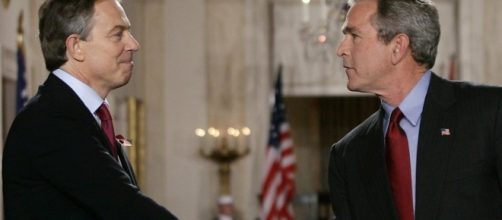It is fair to say that the terrorist attacks on the United States (US) on September 11th, 2001, have had major ramifications throughout the world. It was the day that the global community woke up to the fact that peacetime was well and truly over that took place after the end of the Cold War. But what was most alarming, as to be discovered later on, was that this was not the start of a traditional war; this was an inter-state war transcended between borders. It was also a war over values, a war over religion and a war over idealistic beliefs. But despite this, the response taken by the West, in particular the United States, in response to 9/11 went badly wrong; namely that of the invasion into Iraq in 2003.
Al-Qaeda and Bin Laden
It was a war that was waged against Al-Qaeda and its leader Osama Bin Laden. It was he who orchestrated the attacks against the US and it was from that moment on fifteen years that the hunt for revenge took place. But what I would like to do now is evaluate whether the actions taken by the United States et al. were successful or not. If we take an overallview, one may claim that the job has been largely achieved. OpposingViewsreported ten years on in 2011 the fact that "its leader dead, its terrorist infrastructure virtually dismantled, despised by most nations of the world" illustrates that succinctly. However, where there has been total and horrific failure is in the war in Iraq.
I understand that its leader Suddam Hussein was an evil dictator and was a threat to the rest of the world, but despite this, what was his connection to Al-Qaeda? Although the then president George W. Bush claimed that both were conspiring to attack the United States, intelligence experts rebuffed such a claim and concluded that there were no evidence of ties.
Furthermore, the reasons state for going to war in Iraq were even more suspect. It was claimed that, as reported on Snopesthat "there is no doubt" Saddam Hussein had "reivnigorated his weapons programmes". It was further stated that Saddam's "longer-range missiles" were a threat to "the United States and our allies". However, as later revealed in the Chilcot report this wassimply was not true.It was claimed that the then prime minister of England, Tony Blair, "deliberately exaggerated the threat posed by Saddam Hussein" as reported in the Guardian.
It was also claimed that British intelligence produced "flawed information". Such was the verdict made in the report, which was published on 6 July 2016 that it invoked an apology from Blair himself, who admitted that "I express more sorrow, regret and apology than you can ever know or believe".
Ramifications and results
It was clear that a major mistake was made. However, what confounded such a belief was rooted in not only what was left behind after Saddam was removed but critically what is left today. This has led to avacuum of power, a civil war between rival factions and most notably, the emergence of the Islamic State (IS). The desire to establish an Islamic caliphate around the world, and to destroy the crusaders and the Zionists, the opponents to our freedoms and civilisations has never been tested so severely.
Despite beginning in Iraq, the war has now spread to war-torn Syria. Although it can be claimed that IS is losing ground in the battle against the allies and the forces belonging to President Bashar al-Assad, they are still a significant threat to the world itself.
What we have seen as a result of the invasion into Iraq is scores of deaths, suicide bombings, intense fighting for control and land, and most importantly, a country (Iraq) without a future or a way out. There may not be such attacks by Al-Qaeda, but there is still by Islamic State. The ramifications of invading Iraq are there for all to see. We will see in time what the future holds. But for now, the world is a much more dangerous place than it was fifteen years ago.

